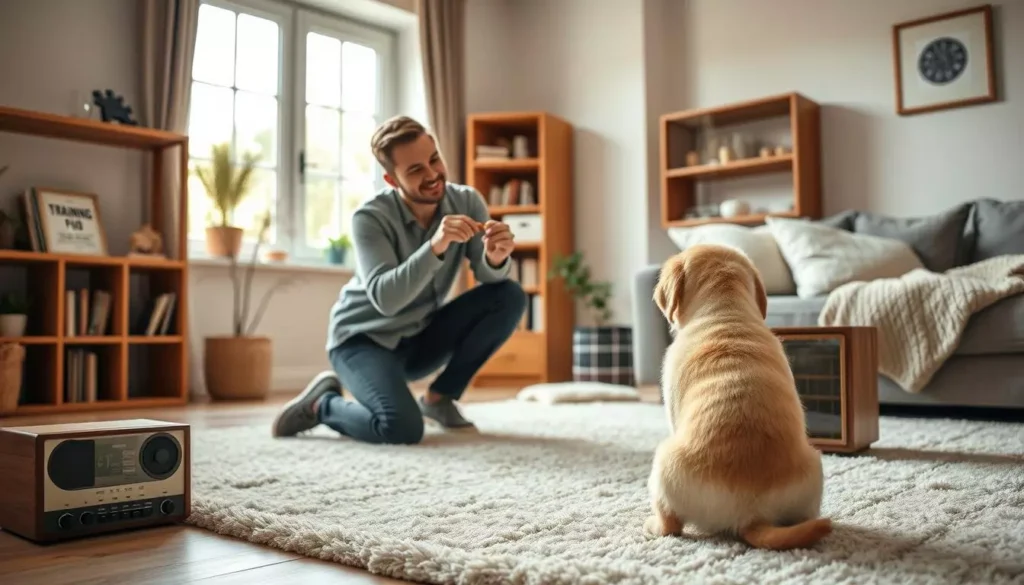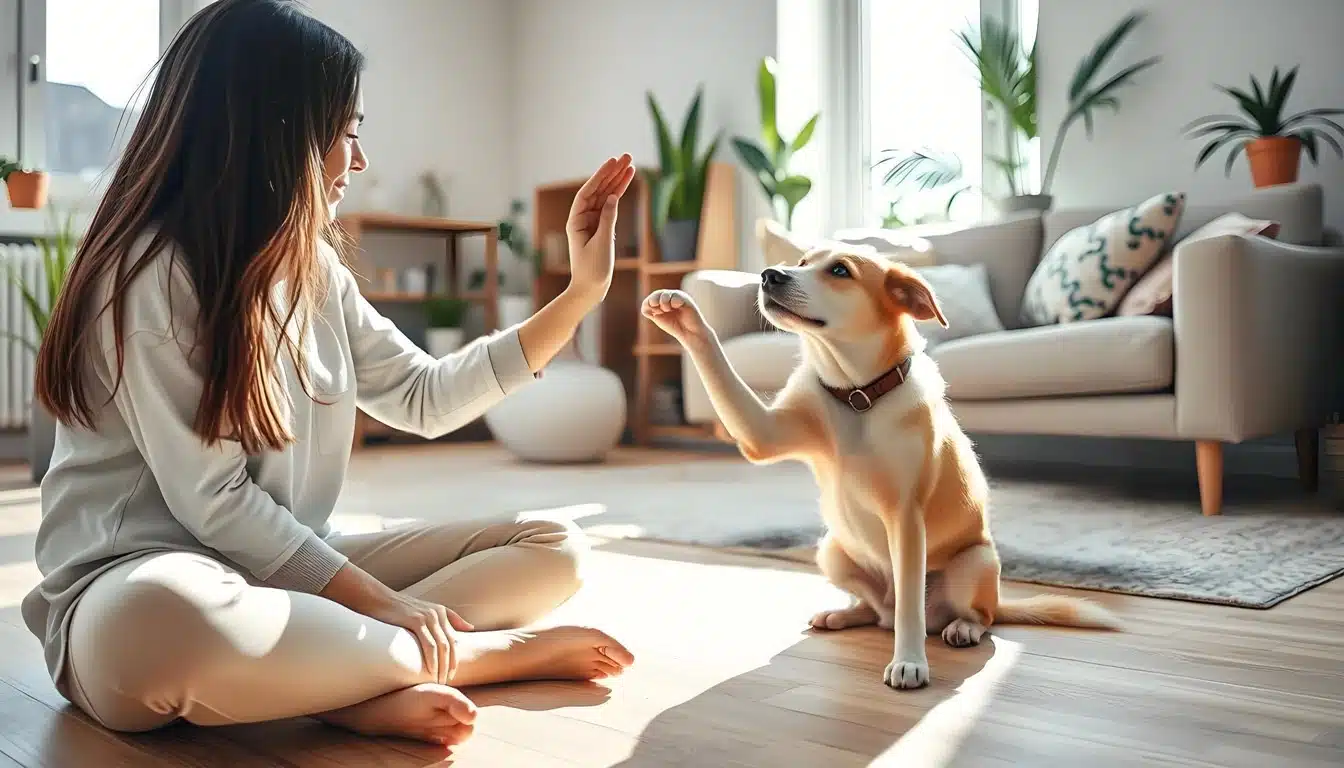The first time I heard my puppy growl and bark, I thought it was cute. But soon, the constant barking disrupted my peace and annoyed the neighbors. Finding a way to stop the barking without hurting my dog's feelings was crucial for both of us.
In this article, I'll share effective ways to stop dog barking. This way, you can enjoy quiet moments while still respecting your dog's natural behavior.
Key Takeaways
- Barking is a natural way for dogs to communicate, but excessive barking can disrupt your home life.
- Understanding the reason behind your dog's barking is crucial for addressing the problem effectively.
- Proven methods to stop dog barking include training, stimulation, and environmental management.
- Utilizing noise distractions can help redirect your dog's attention away from triggers.
- Creating a safe and controlled environment can significantly reduce barking incidents.
Understanding Why Dogs Bark
Dogs bark for many reasons. It's their way to communicate. Each bark can mean excitement, warning, or fear. Knowing this helps us connect better with our dogs.
Communication Through Barking
Barking lets dogs share their needs and feelings. For example, they might bark to tell us about a stranger or to play. Spotting these signs helps us tackle the triggers for dog barking.
Different Types of Barking
Dogs bark in different ways for various reasons:
- Alarm Barking: A warning to alert us about dangers.
- Attention-Seeking Barking: They want our attention or to play.
- Territorial Barking: They're marking their area and warning others off.
- Playful Barking: They're excited to play.
Knowing these types of barking helps us respond better.
Identifying the Triggers
Many things can make dogs bark, like sights and sounds. Common reasons include:
- Other animals passing by
- Noise from vehicles or construction
- Unexpected visitors or doorbells
- Changes in the weather, such as thunder
By knowing these triggers for dog barking, we can find ways to lessen barking.
Does a Muzzle Keep a Dog from Barking?
Understanding how muzzles work in dog behavior is key for pet owners. Many wonder if a muzzle stops a dog from barking. While a muzzle can lower barking in certain situations, it's not a perfect fix. Dogs naturally bark, and muzzles can't stop this completely.
Using a muzzle right means knowing why your dog barks. This helps in managing their behavior better.
Understanding Muzzles and Barking
Muzzles do more than just stop barking. They also prevent biting and help dogs feel safe in scary situations. When used correctly, a muzzle lets your dog breathe and drink. I've seen muzzles help with barking, but it's all about how you use them and train your dog.
When Is a Muzzle Appropriate?
A muzzle is right for several reasons. It's good for dogs that are aggressive or scared of strangers. It keeps everyone safe. But, using a muzzle alone isn't enough.
You need to train your dog too. Always think about what's best for your dog. Talk to a vet or trainer to find the right way to use a muzzle.

How to Stop Your Puppy from Barking
Stopping your puppy from barking requires using positive training methods. A consistent approach helps manage barking and builds trust. This is key to a strong bond with your puppy.
Training Techniques for Puppies
Effective training is crucial to stop unwanted barking. Here are some strategies to consider:
- Positive Reinforcement: Rewarding your puppy for being quiet encourages calmness.
- Consistent Commands: Specific commands like "quiet" or "enough" help communicate what you want.
- Structured Routine: Regular routines in feeding, exercise, and playtime help manage barking caused by anxiety or boredom.
The Importance of Socialization
Socialization is vital for puppies. It helps reduce barking and aids in their development. Here’s how socialization benefits:
- Building Comfort: Early exposure to various situations makes puppies feel at ease in new places, reducing fear-based barking.
- Enhancing Behavior: Meeting other dogs teaches puppies good behavior and stops barking caused by excitement or territorial instincts.
- Creating Calmness: The more familiar your puppy is with the world, the less they bark out of stress or confusion.

Dog Training: How to Stop Dog Barking
Effective dog training is key to managing barking. I use positive reinforcement to create a supportive environment. This way, my dog learns to communicate the right way.
Instead of scolding for barking, I reward good behavior. This strengthens our bond and improves results.
Positive Reinforcement Techniques
Positive reinforcement greatly reduces barking. I reward my dog for being quiet or following commands. For example, I give treats or praise when they stay calm.
This teaches them that being quiet is good. It's a powerful way to train them.
The Role of Commands in Training
Teaching commands like “quiet” and “speak” is crucial. These commands help my dog know when to bark and when to be silent. Using these commands consistently helps my dog understand what I expect.

Physical and Mental Stimulation
To keep my dog happy and healthy, I know how important physical and mental stimulation are. Understanding the importance of dog exercise helps me avoid boredom. This boredom can lead to bad behaviors, like too much barking.
Importance of Exercise
Every dog needs regular exercise, no matter their age or breed. It keeps their heart healthy and helps them stay at a good weight. Some great ways to exercise include:
- Daily walks
- Playtime in the backyard
- Visit to the dog park
- Structured activities like agility training
These activities meet their need for movement and social time. Doing these things every day shows how crucial exercise is in caring for my dog.
Mental Challenges to Prevent Boredom
My dog also needs mental challenges to stay happy. A bored dog might get destructive or bark a lot. To stop this, I add mental games to our playtime. Some good ones are:
- Interactive toys that dispense treats
- Puzzle games that promote problem-solving
- Training sessions that teach new tricks
- Hide-and-seek games with favorite toys
These mental games keep my dog busy and strengthen our bond. Mixing physical exercise with mental games makes them happier. It also keeps our home peaceful by preventing boredom.
Using Noise and Sounds to Stop Barking
Stopping dog barking can be tough. Using certain sounds can help distract dogs from things that make them bark. White noise, calming music, and sound therapy for dogs can make a big difference.
Effective Noise Distractions
White noise machines or apps can make a constant sound. This sound can cover up outside noises. Dogs are less likely to bark when they hear this.
Using a fan or a radio on static can also work. These distractions can really cut down on barking.
Sound Therapy for Dogs
Sound therapy for dogs uses music to calm them. Classical music is especially good at soothing anxious dogs. Mixing this with other sounds can make a dog much quieter.
Try different types of music to see what works best for your dog. It might surprise you.
Environment Management for a Quieter Home
Managing our dogs' environments is key to less barking. By controlling stimuli and setting up safe spaces, we can make our homes quieter. Here are some strategies that work well.
Controlling Visual Stimuli
Dogs bark often because of what they see. To reduce this, we can manage their environment. Here's how to block outside sights:
- Heavy curtains or blinds to block outside views.
- Window films that obscure vision while still allowing light in.
- Strategically placed furniture to obstruct sightlines.
By managing what they see, we can stop unnecessary barking.
Creating a Safe Space
A safe space is vital for our dogs' calmness and security. It should be free from distractions and offer comfort. I include:
- A cozy bed or crate for resting.
- Toys to keep the dog engaged.
- Calm music or white noise to soothe anxiety.
This peaceful area helps control stimuli and improves our dog's happiness. A well-managed space makes our homes quieter.
How Long Can Dogs Bark Without Stopping?
It's important for dog owners to know how long dogs can bark without getting tired. Dogs bark for many reasons, each needing different amounts of energy. Knowing when dogs get tired from barking helps manage their behavior.
Understanding Canine Exhaustion
Dogs get tired from too much physical or mental activity. Barking, though simple, can be tiring for them. The dog's age, breed, and health affect how long they can bark.
Indicators of Fatigue in Barking
It's key to know when a dog is tired from barking. Look for these signs:
- Reduced bark volume or intensity
- Physical signs of tiredness, such as panting
- Loss of interest in barking triggers
- Restlessness or inability to settle down
- Seeking quiet areas away from noise
Knowing these signs helps owners know when to give their dogs a break. This can make them happier and quieter.
| Duration of Barking | Behavioral Signs | Recommended Actions |
|---|---|---|
| 1-5 minutes | Excited, lively barks | Encourage play or redirect attention |
| 5-10 minutes | Decreasing energy, less enthusiasm | Offer a short break or quiet time |
| 10-20 minutes | Resembles panting, lower volume | Provide water and a calm environment |
| 20+ minutes | Physical exhaustion, may lay down | Ensure rest and monitor for stress |
Conclusion
Dogs bark to communicate, but too much can be a problem. This article looked at ways to stop excessive barking. It's important to understand why dogs bark and find solutions that work for everyone.
Using positive methods and managing the environment can help a lot. Training dogs to be quiet strengthens our bond. It makes our home a calmer place.
Creating a safe and understood environment is key. By using these strategies, we can keep our homes peaceful. This way, we and our pets can live happily together.




